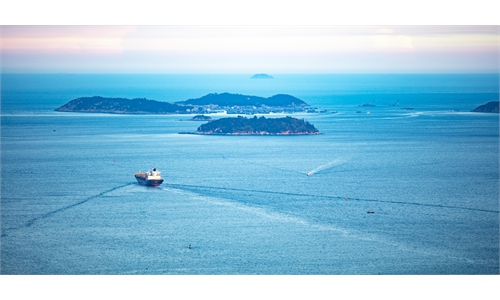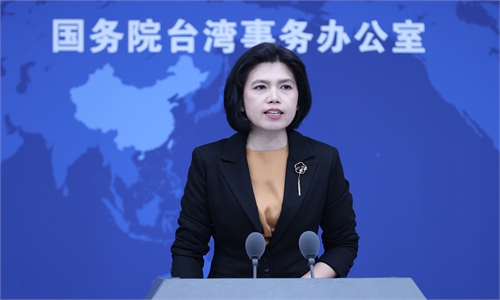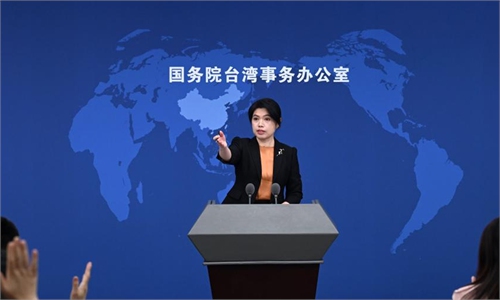Taiwan businesses highly optimistic about mainland economic outlook, ready to invest more in 2024
More investment, cooperation expected to tap into potential of the 1.4b market: chamber head

Visitors browse products showcased by Taiwan compatriots at the Sixth 21st Century Maritime Silk Road Exposition and the 25th Cross-Straits Fair for Economy and Trade in Fuzhou, East China's Fujian Province on May 22, 2023. Photo: VCG
Enterprises from the Taiwan region are optimistic about the economic development of the Chinese mainland and pledge to continue investing to better take advantage of the economic recovery in 2024, representatives of business and industry groups from the island told the Global Times on Monday.
The representatives also stressed their strong expectations for the mainland and the Taiwan region to continue to uphold the 1992 Consensus, opposing secessionism while maintaining peaceful and steady relations and cooperation across the Straits.
The remarks came on the sidelines of the annual two sessions, during which the Government Work Report will be released, outlining the development direction of the world's second-largest economy and setting economic and policy goals for 2024.
On this special occasion, businesses from the Taiwan region are embracing the mainland market, calling for peaceful and integrated development across the Straits with more interaction and cooperation.
The mainland's active efforts on promoting infrastructure development nationwide in recent years, with new roads being built and subway systems being launched, reflected the determination of the central and local governments in boosting the economy, Lai Cheng-i, chairman of the General Chamber of Commerce of the Taiwan island, told the Global Times on Monday.
Despite facing challenges such as China-US trade tensions, the lingering impact from the COVID-19 pandemic and the Russia-Ukraine conflict, the mainland's economy still achieved a remarkable growth rate of 5.2 percent in 2023. This growth rate significantly surpassed that of other major economies worldwide including the US at 2.5 percent, the EU at 0.5 percent, the UK at 0.1 percent and Japan at 1.9 percent.
The mainland's GDP growth also far exceeded the 1.31 percent rate of the Taiwan region.
Business representatives of the Taiwan region said that this economic achievement is commendable and it reaffirms the nation's position as the primary engine driving global economic growth.
"Despite the tough international situation in 2023, the mainland's economic growth remained strong, backed up by the government's efforts and consumption recovery, and I am confident that this trend will continue in 2024," Lai said.
Local governments, including East China's Fujian Province, neighboring the Taiwan region, are constantly improving policies and measures to promote the integrated development of their regions and Taiwan, which have brought significant benefits to businesspeople from the island. It's also made more companies, including those headed by young entrepreneurs, more willing to develop and invest in the mainland, the chamber head said.
There are strong expectations for more trade to take place on both sides.
The first shipment of 23.96 tons of grouper fish from the island of Taiwan arrived in Xiamen, Fujian Province on January 11, marking the formal resumption of related trade after the mainland customs lifted the ban on imports in late December, according to media reports.
Lai expects that there will be more farm and fishery products exported to the mainland.
Moreover, there are expectations for more tourism activities to be promoted across the Straits.
Speaking about the new potential for cooperation, Teng Tai-Hsien, secretary-general of the Straits Economic & Cultural Interchange Association, gives the examples of the mainland's continuous adjustment of its economic structure in moving in the direction of low-carbon consumption, high automation and digitalization, and companies from the island love to take part in the industrial transformation.
Opportunities have emerged in the vast domestic market ranging from the healthcare industry, spurred by an aging population, to modern agriculture and education, Teng said, noting that "businesses of the island of Taiwan should seize the opportunity presented by the mainland's economic transformation and upgrading."
Businesses of the Taiwan island remain optimistic about investing in the mainland this year as the mainland's economy is expected to continue its steady growth trajectory.
In 2023, the Taiwan region approved 328 cases of direct investment in the mainland totaling $3.04 billion. Teng said that 71.23 percent of listed companies in Taiwan had invested in business operations in the mainland.
"After these enterprises generate profits in the mainland, they often intend to reinvest. I believe that the scope of investment will expand this year," Teng said.
The Taiwan secessionist Democratic Progressive Party continues to implement a decoupling policy targeting the mainland, including on the chip industry and people-to-people exchanges, which has affected normal economic interactions across the Straits. Regional business representatives have called for sustainable and stable cross-Straits relations.
This year, the annual two sessions are crucial for the development of cross-Straits relations, especially given the severe impact of "Taiwan independence" secessionist forces and external forces, business representatives told the Global Times.
It is hoped that the two sessions will continue to uphold peaceful and integrated development, promote more exchanges and cooperation across the Straits, and naturally bring the two sides closer together, Teng said.
Over the years, the mainland has offered many preferential policies to businesses from the Taiwan region. For example, the nation is making Fujian Province a demonstration zone for integrated development across the Taiwan Straits, a move that is highly attractive to the businesses from the island.
"It is hoped that more measures like this will be implemented, allowing businesses from the Taiwan region to thrive in the mainland while creating a closer cooperation space for cross-Straits economic and trade exchanges," Teng said.



